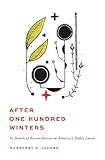After One Hundred Winters : In Search of Reconciliation on America's Stolen Lands / Margaret D. Jacobs.
Material type: TextPublisher: Princeton, NJ : Princeton University Press, [2021]Copyright date: ©2021Description: 1 online resource (354 p.)Content type:
TextPublisher: Princeton, NJ : Princeton University Press, [2021]Copyright date: ©2021Description: 1 online resource (354 p.)Content type: - 9780691226644
- Indians of North America -- Civil rights -- United States
- Indians of North America -- United States -- Government relations
- Indians of North America -- United States -- Politics and government
- Reparations for historical injustices -- United States
- Transitional justice -- United States
- HISTORY / Native American
- Abolitionism
- Adoption
- American Indian Stories
- American Indian boarding schools
- Annual report
- Apache
- Apology Resolution
- Arapaho
- Arkansas River
- Armenian Genocide
- Aunt
- Bear River Massacre
- Bernie Farber
- Bison hunting
- Black Kettle
- Boarding school
- Bureau of Indian Affairs
- Burial
- Cache Valley
- Canadian Indian residential school system
- Cemetery
- Ceran St. Vrain
- Cherokee Nation
- Cherokee
- Cheyenne
- Comanche
- Coroner
- Dakota people
- Dawes Act
- Edward Everett Hale
- European colonization of the Americas
- Evangelical Lutheran Church in America
- Extended family
- Fort Lyon
- George Armstrong Custer
- George Bent
- Grandparent
- Helen Hunt Falls
- Helen Hunt Jackson
- His Family
- Historical society
- History wars
- In Cold Blood
- In This World
- Indian Burial Ground
- Indian Citizenship Act
- Indian Reorganization Act
- Indian Territory
- Indian people
- Indigenous peoples of the Americas
- Indigenous peoples
- James Beckwourth
- James Russell Lowell
- John Chivington
- Joseph LaFlesche
- Justin Trudeau
- Keith Windschuttle
- Lakota language
- Lakota people
- Lodgepole
- Month
- My Father
- National Sorry Day
- Native Americans in the United States
- Nebraska State Historical Society
- New Deal
- New Laws
- Niobrara River
- Noongar
- Northwestern Band of the Shoshone Nation
- Oliver Wendell Holmes Sr
- Omaha Reservation
- Oregon
- Overland Trail
- Pawnee Scouts
- Pawnee people
- Permanent Settlement
- Presidency of Barack Obama
- Ralph Waldo Emerson
- Refugee
- Richard Henry Pratt
- Rutherford B. Hayes
- September 11th Victim Compensation Fund
- Settler colonialism
- Silas Soule
- Sixties Scoop
- Standing Bear
- Stolen Generations
- T. S. Eliot
- The Dakotas
- Thomas Tibbles
- Thomas Wentworth Higginson
- To This Day
- Treaty rights
- Treaty
- Tulsa race massacre
- Vine Deloria Jr
- William Bent
- Works Progress Administration
- Xavier Herbert
- 323.1197 23
- E93
- online - DeGruyter
| Item type | Current library | Call number | URL | Status | Notes | Barcode | |
|---|---|---|---|---|---|---|---|
 eBook
eBook
|
Biblioteca "Angelicum" Pont. Univ. S.Tommaso d'Aquino Nuvola online | online - DeGruyter (Browse shelf(Opens below)) | Online access | Not for loan (Accesso limitato) | Accesso per gli utenti autorizzati / Access for authorized users | (dgr)9780691226644 |
Frontmatter -- Contents -- Introduction -- Part One Our Founding Crimes -- Chapter 1 Blood -- Chapter 2 Eyes -- Chapter 3 Spirits -- Chapter 4 Bellies -- Chapter 5 Tongues -- Part Two Promoting Reconciliation in Nineteenth-Century America -- Chapter 6 Rousing the Conscience of a Nation -- Chapter 7 Friends of the Indian -- Chapter 8 Indian Boarding Schools -- Part Three Searching for Truth and Reconciliation in the Twenty-First Century -- Chapter 9 America’s Stolen Generations -- Chapter 10 The Hardest Word -- Chapter 11 Where the Mouth Is -- Part Four A Groundswell for Reconciliation -- Chapter 12 Skulls -- Chapter 13 Bones -- Chapter 14 Hands -- Conclusion Hearts -- Acknowledgments -- Notes -- Further Reading -- Index
restricted access online access with authorization star
http://purl.org/coar/access_right/c_16ec
A necessary reckoning with America’s troubled history of injustice to Indigenous peopleAfter One Hundred Winters confronts the harsh truth that the United States was founded on the violent dispossession of Indigenous people and asks what reconciliation might mean in light of this haunted history. In this timely and urgent book, settler historian Margaret Jacobs tells the stories of the individuals and communities who are working together to heal historical wounds—and reveals how much we have to gain by learning from our history instead of denying it.Jacobs traces the brutal legacy of systemic racial injustice to Indigenous people that has endured since the nation’s founding. Explaining how early attempts at reconciliation succeeded only in robbing tribal nations of their land and forcing their children into abusive boarding schools, she shows that true reconciliation must emerge through Indigenous leadership and sustained relationships between Indigenous and non-Indigenous people that are rooted in specific places and histories. In the absence of an official apology and a federal Truth and Reconciliation Commission, ordinary people are creating a movement for transformative reconciliation that puts Indigenous land rights, sovereignty, and values at the forefront. With historical sensitivity and an eye to the future, Jacobs urges us to face our past and learn from it, and once we have done so, to redress past abuses.Drawing on dozens of interviews, After One Hundred Winters reveals how Indigenous people and settlers in America today, despite their troubled history, are finding unexpected gifts in reconciliation.
Mode of access: Internet via World Wide Web.
In English.
Description based on online resource; title from PDF title page (publisher's Web site, viewed 01. Dez 2022)


